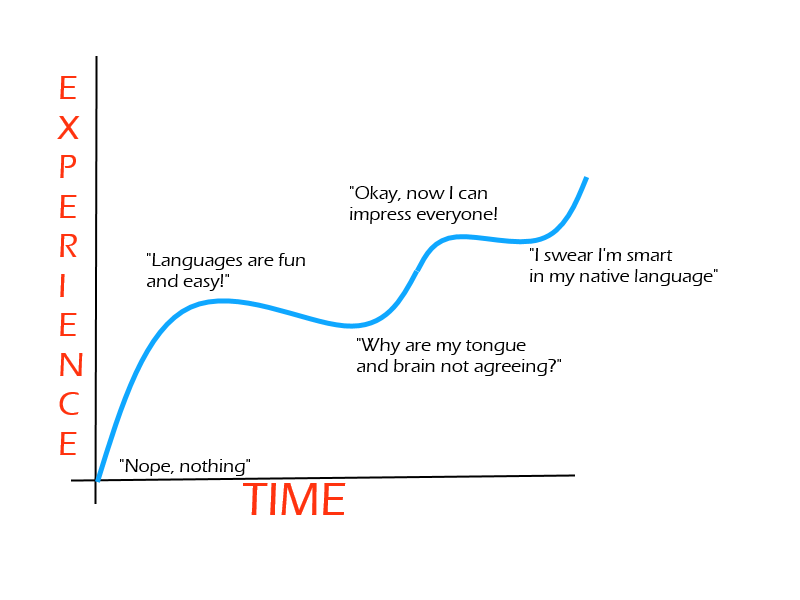Just like with any other long-term goal, there are many roadblocks for language learning. The process to learn a new language is quite the roller coaster, quickly alternating between thrilling sections and difficult climbs.

So how easy is it to learn a language? A lot of this will depend on your current level. Personal experiences tend to vary wildly – but they often follow a pattern. Once you pass the intimidating first lessons, you often hit a sweet spot in which you can learn the basics quickly.
Get Ready for the Next Big Leap!
However, there are two key stages in which you will face bigger roadblocks: one is when trying to jump from “small talk” to “conversational”, and the other one is when you need to cross the invisible barrier between “intermediate” and “native-like.”
The weird thing is, the roadblocks that you can hit on either stage can be surprisingly similar. Check out 6 common roadblocks when learning a new language, plus some quick and dirty tips to jump over them.
#1 – The intermediate-level plateau
When you look back on your own language-learning process, you will start remembering fondly those times in which you seemed to hit a new milestone every other week.
Instead, these days it often feels like you are stuck reviewing the same level of materials over and over. You go through your flashcards at the same speed, and you feel just as clumsy as last week when speaking in public.
Just like with weight loss, it seems like there’s a point in which it takes work to stay at the same level.

How to overcome this?
Dip your toes outside your comfort zone.
What this means will depend on your chosen comfort. Try a new method or language learning app for a while. Start watching a foreign language TV in a completely new accent. Change the people and the setting for your weekly conversation club.
#2 – You’re acutely aware of (and embarrassed by) your mistakes
You are trying to use your hard-earned vocabulary more frequently, so you hunt for opportunities to speak French in the real world. The problem is, your well-rehearsed greeting sounds perfect, but you quickly lose confidence after you move into more spontaneous terrain.
Ugh – that is not the verb form I was supposed to use! They must think I’m not smart!
ERROR: Brain-to-mouth connection missing.
How do you keep this from freezing you?
Order a mojito and embrace the mistakes. The truth is, you made a small error and our interlocutor probably noticed – but they didn’t ask you to clarify, did they? Chances are, they probably understood what you meant anyway. And that’s what communication is all about!
Plus, the fact that you were able to notice your own mistake, while you were still speaking, is quite the accomplishment! It’s likely that just a few months ago, you wouldn’t have even heard about the grammar rule you just broke.
#3 – The grammar feels too abstract
Why does the “no” go here and not there!
This is a particularly common roadblock for those who are learning a foreign language for the first time. Often, this comes down to the fact that you are trying to apply the rules of your native language to a different one. As a result, you will feel stilted and awkward when speaking or writing.
Pro tip: this may also happen if you are already bilingual, but your previous languages belong to the same family. For example, a French and Spanish speaker jumping into German or Hebrew!
How do you surpass this roadblock?
Take a step back from grammar and focus on actual real-life scenarios and expressions. This is were watching subtitled TV series helps you learn a language!
Also, be kind to yourself if you make the occasional error! As you can see in many of our shows, even native speakers tweak grammar rules whenever slang calls for it!
#4 – Feeling misunderstood
A typical scenario on any holiday “language learning” trip. You approach anyone for directions, or even try to strike up conversation with someone new, and you constantly feel misunderstood by everyone around you.

How do you deal with this?
Add some gestures and charade-worthy mimics to it! Even in your native language, most of your communication is non-verbal. So if you are trying to communicate something critical, you just need to be deliberate about it.
Back in English-land, you point, smile, and hold your own body in different ways across the conversation in order to make a point. It’s not cheating to do this in a foreign language!
#5 – You are swimming without a destination
A well-known stat is that it takes only 3,000 words to be conversational, but about 20,000 in order to be native-like. Now, you are not about to learn all 17,000 extra words this month. You will have to tackle this little by little.
But how? Do you just pick up a dictionary and start memorizing?
This is a common language-learning roadblock faced by those who are trying to jump from intermediate to advanced (or towards the end of the intermediate plateau). Without a good plan, you may end up picking up new flashcard sets without direction. You’re just floating in a sea of new words that you may never use
How do you prioritize your new vocabulary?
Imagine your ideal first date. If you are trying to impress the future love of your life, you won’t need very specialized work vocabulary and you probably won’t discuss occupational health and safety guidelines.

Instead, you will need to be able to describe the fun part of your livelihood, plus a couple of hobbies and your allergies. Start with those topics, and take it from there.
For this, you can pick up a documentary on your favorite historical period, or read a novel with a main character that’s a lot like you.
#6 – The race seems endless
Not so much of a technical roadblock, but more of a psychological trap. When you remember how long does it take to learn Spanish, Russian, or French, and you review how much you have invested on it already plus how much you still have to go…
… It’s just very easy to lose sight of the finish line.
Little by little, this will make your language learning efforts slide. Maybe you’ll reschedule your next session. Or perhaps you’ll miss the next conversation club meeting.
How to get out of this rut?
Now it’s time to review your beginning and add some steroids to your motivation.
Do you still have your very first learning materials at hand? Go through them with a fresh pair of eyes, and note how easy and simple it all feels now. Create a vision board that reminds you why you chose to learn a language in the first place.

…And Jump!
When languages feel like an obstacle race, remember that it the last fence always takes a little bit extra stamina. Any of the tips above can act as a quick boost to your learning muscles.
Lingopie is an on-demand service offering thousands of hours of foreign language TV series and movies. Our goal is to help you master a second language and a second culture. Sign up for a free trial.





